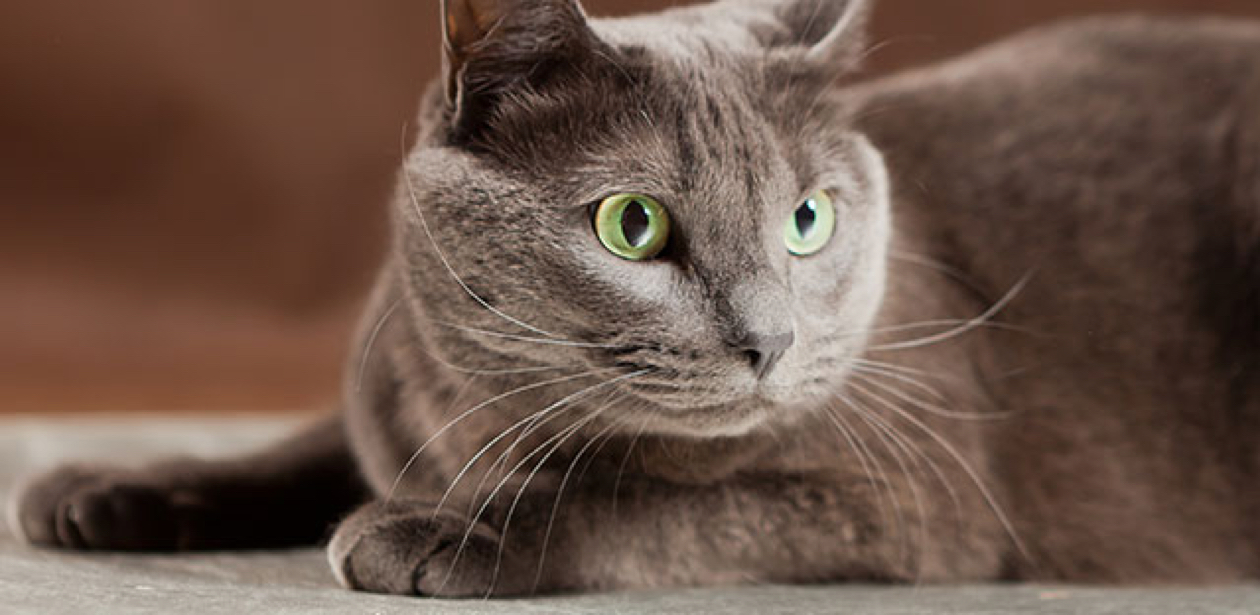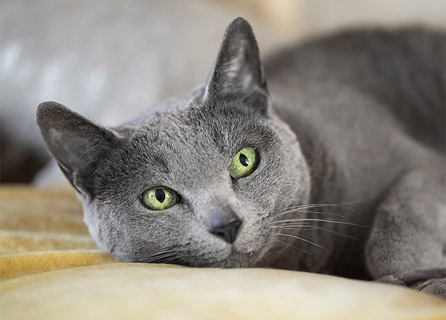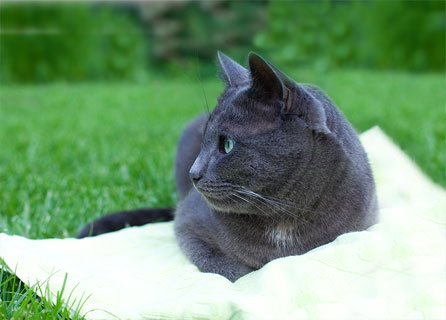
All about your Russian Blue
Gentle yet playful, the elegant Russian Blue will fit well into most households. Learn more about this devoted and loyal cat, from their grooming and exercise needs, to the things you can do to keep them happy and healthy.
Breed information & advice
The shorthaired Russian Blue is affectionate, calm and will love spending time with you. They have a reputation for being shy and even reserved, but don’t get the wrong idea as they love to climb, jump and retrieve. Here's more you should know:
- Far from destructive they're graceful, agile, and generally a well-behaved breedFar from destructive they're graceful, agile, and generally a well-behaved breed
- They're meticulous in their hygiene habits, and their coat will need minimal groomingThey're meticulous in their hygiene habits, and their coat will need minimal grooming
- They'll typically weigh between from 3kg to 5kg, when fully grownThey'll typically weigh between from 3kg to 5kg, when fully grown
- A healthy Russian Blue will usually live for 10 to 15 yearsA healthy Russian Blue will usually live for 10 to 15 years
Typical size of a Russian Blue: Medium

Recommended exercise & nutrition
They're quiet and relaxed but also muscular, so while the Russian Blue doesn’t require lots of exercise, physical activity is still important for their strength. Try playing “fetch” with them, which will also keep their razor-sharp brain active.
Known for their healthy appetite, your pet will be happy eating any type of cat food – but don’t let them overeat, as this breed is prone to becoming overweight. Remember that they're also a carnivore by nature and will appreciate a protein-rich diet.
You should feed your cat twice a day from the age of seven months. When they're a kitten you should feed them three times a day. The amount of food you feed them will depend on their size, age and activity levels – always read the packet instructions for portion size suggestions.
Intelligent and playful
Your Russian Blue will love nothing more than playing games with their family.

Common health problems & illnesses
Russian Blues are generally healthy cats but they’ll need regular check-ups and vaccinations to stay in good shape. There are some conditions that this breed may be more prone to, and it’s worth being aware of the main symptoms, so you know what to watch out for.
Most common in middle-aged Russian Blues, hyperthyroidism usually starts with a benign tumour in the thyroid gland that causes it to produce too much of the thyroid hormone, that then speeds up metabolism. Signs to look out for in your cat include hyperactivity and nervousness, as well as vomiting and weight loss. Easily managed, there’s a high chance a cat will lead a healthy and normal life once treated through medication, radioactive iodine or surgery. A standard blood test can detect the illness.
Kidney disease, when one or both organs are unable to clear waste from the blood properly, can develop naturally as a cat ages. It can also occur due to infection, a tumour, injury or even poisoning. The effects can usually be managed well, and if caught in good time a cat will live a healthy life. Signs to watch out for include loss of appetite or weight, vomiting and diarrhoea.
Russian Blues may develop heart problems, specifically Hypertrophic Cardiomyopathy (HCM). Cardiomyopathy relates to any disease that affects a cat’s heart muscle, and can affect this breed. Hypertrophic cardiomyopathy is one of the more common of these heart conditions and causes thickening of the heart’s muscles, making it more difficult for the organ to relax between contractions. Keep an eye out for any signs in your cat such as loss of appetite, weakness or difficulty breathing. Speak to your vet, who will be able to do a full examination and advise on treatment options, if you have any concerns.
Cat name popularity
If you’re struggling to think of a name for your Russian Blue, take a look at the most popular ones at Tesco Bank Pet Insurance for inspiration.
Luna
Bella
Willow
Milo
Cleo
Average treatment costs
Wondering whether pet insurance for your Russian Blue is worth it? We’ve put together the top five conditions claimed for by Tesco Bank Pet Insurance customers in 2021. To give you an idea of how much vet bills can vary, we’ve shown both the average cost and the top 10% most expensive costs for each condition.
Top five conditions and average costs
|
Condition |
Average Cost |
10% Most Expensive |
|---|---|---|
|
Kidney/renal disease |
£614 |
£952 |
|
Neurological condition |
£1,431 |
£2,281 |
|
Diarrhoea |
£1,215 |
£2,742 |
|
Urinary condition |
£318 |
£395 |
|
Respiratory condition |
£231 |
£349 |
Tesco Bank Pet Insurance claims data from paid treatments including excesses from 01/01/21 to 31/12/21.
Considering Russian Blue insurance?
We know your cat is an important member of the family, so give them the protection they deserve with Tesco Bank Pet Insurance.
Tesco Bank Pet Insurance is arranged, administered and underwritten by Royal & Sun Alliance Insurance Ltd.
Grooming advice
Russian Blues are exceptionally clean cats that require minimal grooming or cleaning. Use a metal comb to remove any loose hair from your cat’s plush coat and redistribute natural oils once or twice a week. In the spring, expect to brush a little more often to help them shed their thick winter coat. Even if your cat’s fur doesn’t need a brush, they will appreciate the extra attention.
The Russian Blue has wide ears, so it’s important to check inside them once a week for any debris, and gently clean them with damp cotton-wool buds.
Your cat can be encouraged to file their own claws with a scratching post, but you can trim them as and when needed, while you should clean the dirt from under them when it becomes noticeable.
Ideally you should also try to brush their teeth once a day with a pet toothpaste and pet toothbrush, but once a week will do. This will help to remove plaque and tartar build-up and prevent periodontal disease (when a tooth’s deep supporting structures become inflamed).
Fun & interesting facts
- It’s widely believed this breed originated on the Archangel Isles of northern Russia.
- They're typically an exotic blue, and the cartoon cat Tom of ‘Tom and Jerry’ fame is thought to be a Russian Blue because of the colour of his coat.
- They're often regarded as the healthiest breed of cat.
- A Russian Blue kitten can be born with “ghost stripes” that gradually fade as they grows – a reminder that all cats carry a tabby gene.
- In Russian folklore, they are seen as a good luck charm.
Important information
The content on this page aims to offer an informative introduction to pet breeds, but does not constitute expert veterinary advice. If your dog or cat falls ill or has an injury, contact your vet immediately. Tesco Bank Pet Insurance has a partnership with vetfone™ which means that as a customer, you can benefit from their advice as part of your policy.
Tesco Bank Pet Insurance is arranged, administered and underwritten by Royal & Sun Alliance Insurance Ltd. The vetfone™ service is provided by VetsDirect Ltd.
All facts and figures were correct at date of publication and were compiled using a range of sources.
Vetfone™ is a 24/7 unlimited, free telephone or video call service that provides expert advice from vets or vet nurses qualified with the RCVS (Royal College of Veterinary Surgeons). If your pet has a medical emergency, or you need advice on health, grooming, feeding or behaviour Vetfone™ is there to help.
As a Tesco Bank Pet Insurance customer, you can access friendly, expert advice from qualified Royal College of Veterinary Surgeons as a standard benefit with your policy, and the service is provided at no additional cost. A quick telephone call or video call could answer any questions you have about your pet, give you peace of mind and could even save you a trip to the vet.
Tesco Bank Pet Insurance is arranged, administered and underwritten by Royal & Sun Alliance Insurance Ltd. The vetfone™ service is provided by VetsDirect Ltd.
Discover more breeds
Browse our other cat and dog guides to learn about some of the UK’s most popular breeds.
